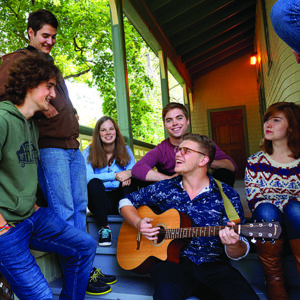
In many respects, life seems to be returning to some semblance of normality for the first time since the beginning of the Covid-19 pandemic. While our routines may now resemble our pre-pandemic activities, the reality is that many of us are not the same. The past two years have changed us. They’ve taken a toll on our lives and our well being in countless ways. Mental health is one of them. A multitude of studies have addressed the negative impacts that the pandemic has had on mental health, including that of teenagers. Significant increases in teen anxiety and depression rates since the beginning of the pandemic have been well-documented. The pandemic has also resulted in many unmet critical developmental needs, particularly social needs. The halt of in-person social opportunities has stunted the social development of many young people while simultaneously negatively impacting mental health.
Since the pandemic began, a growing number of young people have made the decision to take a gap year prior to attending university. Done right, gap years can be a wonderful time for young people to step out of their comfort zones and to gain self-awareness, confidence, and knowledge, while helping them to clarify future career and educational goals.

I’ve spent my entire career working with the emerging adult population, both domestically and globally. On countless occasions, I’ve interacted with students and parents who grasped onto the notion that a new city, country, or adventure would be the answer to all that ailed the student. As I think about those conversations, there’s a saying that comes to mind: “Wherever you go, there you are.”
The reality is that getting away does not fix unaddressed issues, it just doesn’t.
It’s critical for parents and students to acknowledge that getting away is not often the solution to mental health or interpersonal challenges. In fact, sometimes being far away from home exacerbates issues.
As individuals prepare for gap year experiences, they often spend endless hours reviewing itineraries and packing lists, with great attention given to finding the perfect backpack and gear. Gap year students should spend equal effort in creating plans for self-care and well-being while away. This looks different for each person.
The following are some important questions to ponder as you prepare:
- How will you manage your mental health during your gap year experience?
- What are strategies that typically help you when you’re feeling down, lonely, anxious, or homesick? Which of these will you have access to and are you willing to try while on your gap year?
- What are you willing to do to ensure that you take good care of yourself while away?
- If you’re on a psychotropic medication, it’s critical that you investigate how you will get access to your medication while away. There are often different regulations in other countries, and some counties have strict regulations about prescriptions being brought into the country. If you’re working with a mental health provider at home, it is worthwhile to discuss these plans at length with that person prior to your departure.
Helpful Strategies to Consider to Support your Mental Health:
 Create a music playlist that lifts you up when you’re feeling down;
Create a music playlist that lifts you up when you’re feeling down;- Bring a journal so you can document your experience;
- Have some loved ones write words of encouragement in a journal that you take with you on your gap year experience so you can refer to it when you’re having a hard moment or day;
- Download a meditation app on your phone so that you can listen to a calming meditation if you’re feeling anxious or having trouble sleeping;
- Write a letter to yourself prior to going on your gap year experience highlighting your reasons/goals for choosing this path;
- Finally, you might want to consider a creative project you can engage with while away (be resourceful, you never know what you might find while wandering that you can use for a creative project).
Most worthwhile life experiences involve highlights and challenges. Ultimately, learning to navigate the bumps and weather the storms will lead to greater self-awareness, growth and an overall sense of accomplishment. Being prepared and prioritizing your mental wellness and self care will assist you in making the most of your gap year experience!
ABOUT THE AUTHOR
 Laura Thompson, Ph.D., LPC is a mental health counselor based in Boulder, Colorado and a Co-Founder of P3 Mental Health Advisors. As an educator and consultant, she loves sharing her knowledge and experience with others so that they can strengthen their abilities in both identifying and responding to the mental health challenges of the individuals and program participants with whom they work.
Laura Thompson, Ph.D., LPC is a mental health counselor based in Boulder, Colorado and a Co-Founder of P3 Mental Health Advisors. As an educator and consultant, she loves sharing her knowledge and experience with others so that they can strengthen their abilities in both identifying and responding to the mental health challenges of the individuals and program participants with whom they work.
Categories
- Advising (6)
- Alumni (2)
- Career (4)
- College & University (13)
- Communication (17)
- DEIA (4)
- Fair Trade Learning (3)
- Finances (11)
- Gap Year Benefits (66)
- Growth & Development (5)
- Leadership (5)
- Learning & Reflection (53)
- Mental Health (3)
- Planning (57)
- Professional Development (4)
- Research (3)
- Risk Management (3)
- Safety (5)
- Service-Learning (10)
- Standards & Accreditation (1)
- Sustainability (6)
- Voices Project (20)
